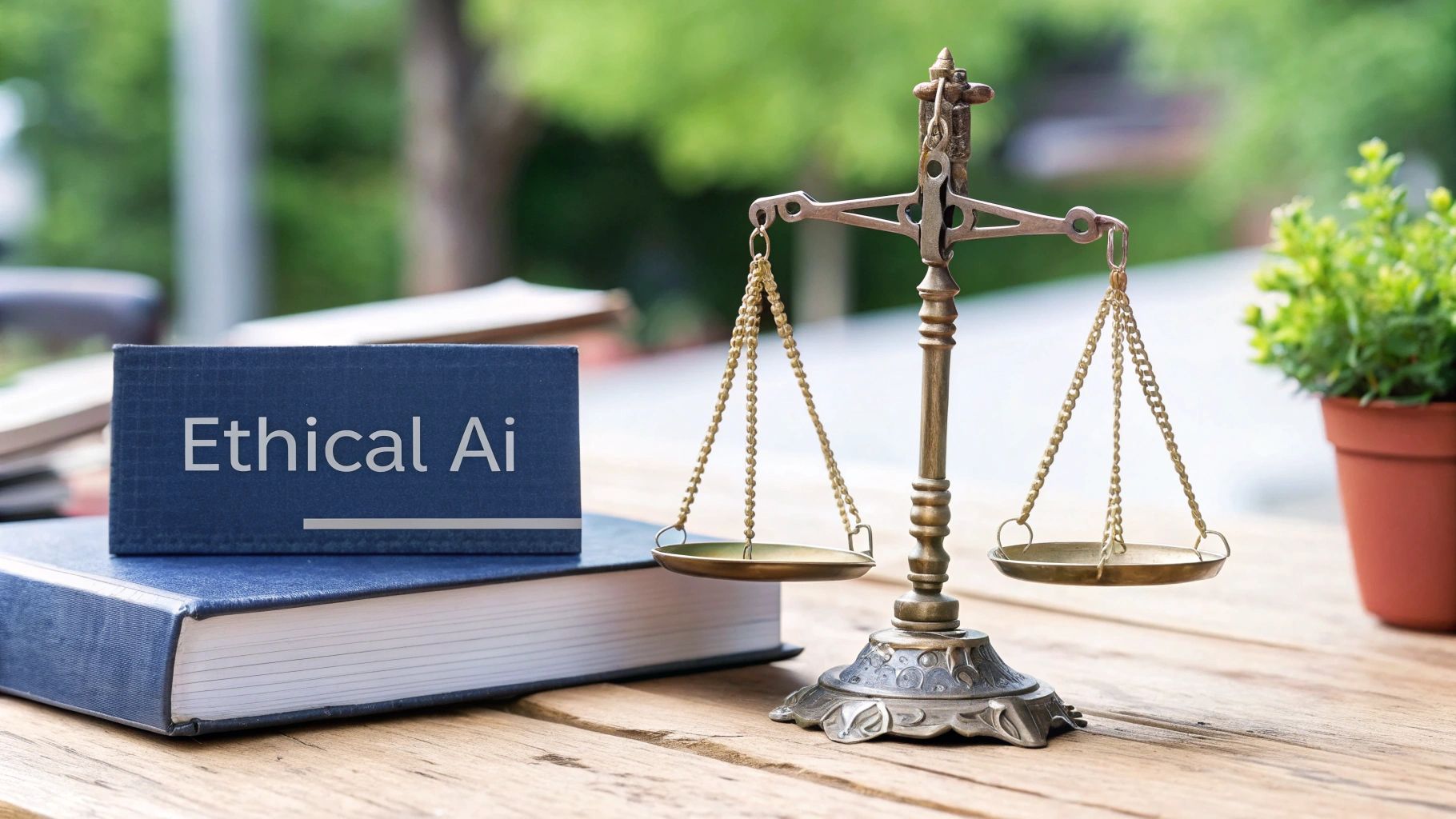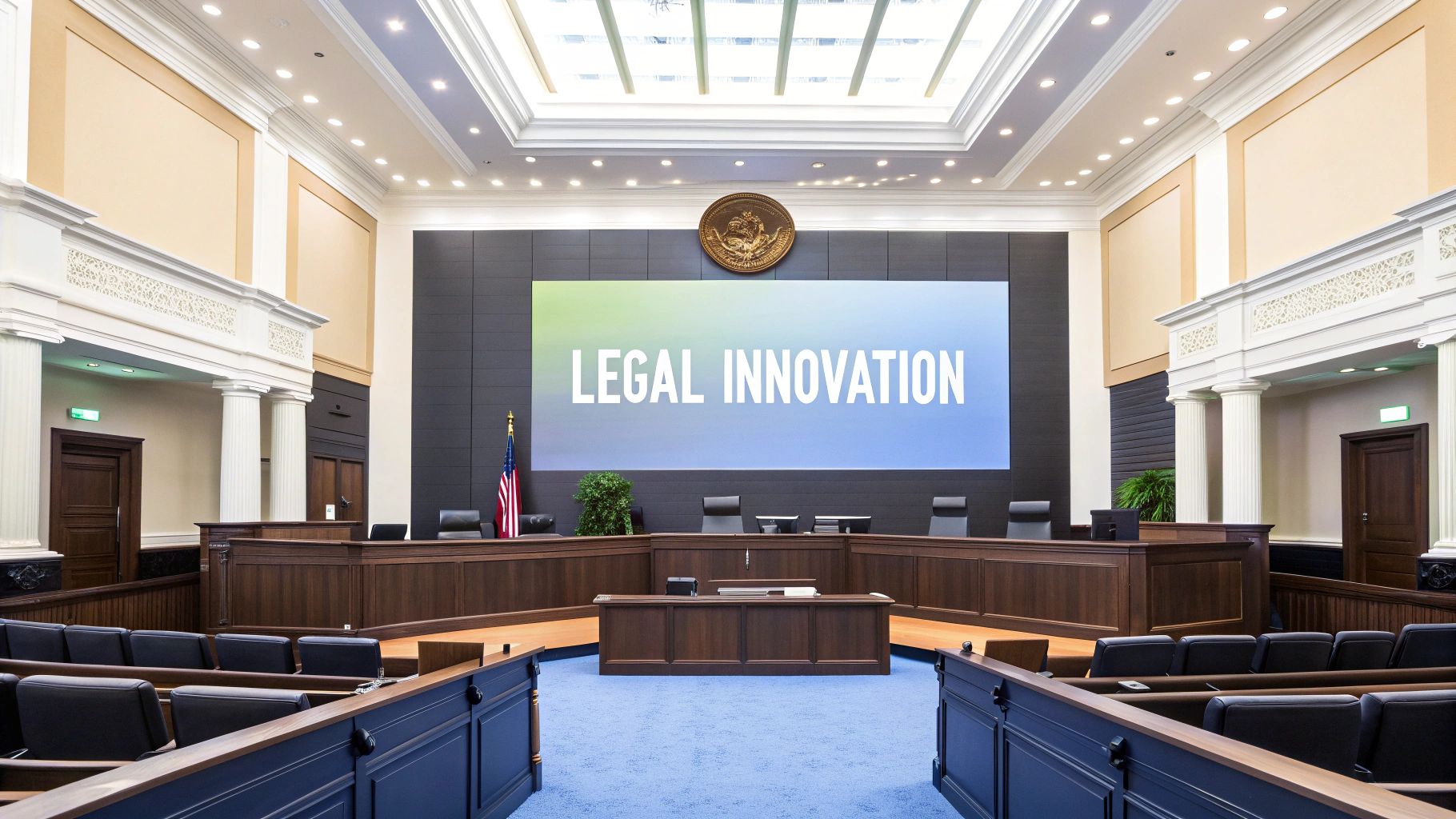What Exactly Is an Artificial Intelligence Lawyer?
Let's be clear: an "artificial intelligence lawyer" isn't a robot attorney delivering dramatic closing arguments in a courtroom. Not yet, anyway. While that mental image is admittedly entertaining, the current reality of AI in law is a bit more practical. At Cordero Law, we're talking about sophisticated software designed to handle specific legal tasks—tasks that previously required human lawyers.
These AI systems can analyze documents, predict case outcomes, and draft standard legal paperwork like Non-Disclosure Agreements (NDAs). They can even provide basic legal guidance in certain situations. This is all possible thanks to machine learning algorithms, which allow these systems to learn from massive datasets of legal cases, statutes, and precedents. It's like the ultimate law school cram session, fueled by data instead of caffeine.
A key takeaway here is that AI lawyers are not replacing human attorneys entirely. They're more like super-powered assistants, augmenting our abilities and freeing us from tedious, repetitive tasks. No one attends law school dreaming of spending hours reviewing discovery documents. That's where AI truly excels, especially when it comes to finding that one crucial email buried in thousands of pages of discovery.
So, What's the Big Deal?
Many legal professionals are genuinely excited about the potential of AI. This is surprising, considering the legal field is often slow to adopt new technology. We still use fax machines, after all! However, a 2025 report indicated that 72% of legal professionals viewed AI as a positive development. Even more encouraging, roughly half of law firms were actively exploring AI applications.
This enthusiasm is understandable given the legal AI market was valued at USD 1.45 billion in 2024, with a projected compound annual growth rate (CAGR) of 17.3%. Learn more about AI's impact on the legal field here. This growth is no surprise, considering the sheer volume of data involved in legal work practically begs for automation.
What Does an AI Lawyer Do?
AI is changing how lawyers work daily. At Cordero Law, we’re using AI to streamline document review (a task no young associate will ever miss), accelerate legal research (which used to take days), and automate the drafting of routine documents.
The real benefit is that AI gives us back valuable time and mental energy. This allows us to focus on the strategic, creative work that requires human judgment. Plus, clients appreciate not being billed attorney rates for tasks a computer can handle.

The Daily Reality: How Lawyers Are Actually Using AI
Let's be honest, the legal field isn't exactly known for being on the cutting edge of technology. Fax machines are still a thing. Fax machines! But times are changing, and AI is popping up everywhere. Even I've integrated it into my daily routine, which, frankly, surprised me.
A year ago, I was a skeptic. Now? AI is an essential part of my workflow. At Cordero Law, we use what we’re calling "artificial intelligence lawyers"—at least for now—primarily for document review and analysis, the bane of every young lawyer’s existence. We also use it for legal research. Tasks that used to take days are now completed in hours, sometimes even minutes.
AI and the Grind: Automating the Tedium
Here's the key takeaway: AI has proven especially useful for summarizing depositions. Anyone who’s slogged through hundreds of pages of deposition transcripts knows the pain. It’s also incredibly helpful for drafting routine documents like NDAs and basic contracts. This frees up significant time and mental bandwidth. There are other applications as well… now, what was I saying? Right, AI.
There's a lot of hype about how AI will supposedly revolutionize the legal profession. But the reality is more straightforward: it's making our lives easier and allowing us to be more effective lawyers.
It's important to note that the technology isn't flawless. You absolutely must review everything. I learned this the hard way when the AI confidently cited a completely fabricated legal case. It sounded legitimate, but… wasn't. At all.
Speaking of real, a recent study revealed that as of 2024, most lawyers are using generative AI (GenAI) daily, with another 25+% using it weekly. Only about 4% reported using it yearly. More detailed statistics are available here. This highlights how prevalent AI is becoming in law firms globally. Even in places that probably still use fax machines. (Mostly kidding.)
Where AI Shines (and Where It Doesn't)
The greatest benefit of these AI legal tools? They free us up for the creative, strategic work that requires human judgment. The work clients should be paying for. (And clients appreciate that, by the way. No one wants to pay a lawyer to read documents a computer can scan.) This allows lawyers to focus on delivering the best possible service and representation.
AI excels at certain tasks, like finding the proverbial needle in a haystack of documents. But it can't replace the human element of law. It can't connect with a jury, strategize on the fly, or… well, it just can’t be a lawyer. Yet.
The following table summarizes some key areas where AI is making a difference in legal practices, along with estimated time savings compared to traditional methods.
Common AI Applications in Law Firms
This table shows the most common applications of artificial intelligence in legal practice and their estimated time savings compared to traditional methods.
| AI Application | Traditional Time | AI-Assisted Time | % Time Saved |
|---|---|---|---|
| Document Review | 40 hours | 10 hours | 75% |
| Legal Research | 20 hours | 5 hours | 75% |
| Deposition Summarization | 10 hours | 2 hours | 80% |
| Contract Drafting | 5 hours | 1 hour | 80% |
As you can see, AI is significantly reducing the time spent on tedious tasks, allowing lawyers to dedicate more time to strategic, client-focused work.

The Client Perspective: What AI Lawyers Mean For You
Okay, so we've discussed AI and how we lawyers use it. But what does it mean for you, the client? What's the benefit? Honestly? Probably a few significant advantages.
We're talking lower costs, faster turnaround times, and—potentially—better results. Let me explain.
Costs, Costs, Costs
First, the big one: money. Legal services can be expensive. This is largely because—frankly—legal work is very time-intensive. Think about it: researching case law, reviewing documents…it all takes time.
This is where AI can make a difference. A document review that might take a junior associate 15 billable hours can often be handled by AI in 30 minutes. This translates to real savings we can pass on to clients. We're talking 30-70% cost reductions on some projects, depending on the case.
Speed: Justice Delayed, Justice Denied (and Expensive)
Second, no one wants their legal issues dragging on. The stress, the uncertainty…it can put your life on hold. AI can significantly speed things up. By automating routine tasks, cases that might have taken months can move much more efficiently. This is especially important for smaller clients who can't afford prolonged disruptions to their businesses or lives.
Quality (Not Just Quantity): The AI Advantage
Here's another key point. AI can often analyze more data, consider more angles, and find more relevant precedents than any human lawyer. AI doesn't get tired, distracted, or need coffee. This means AI can sometimes uncover winning arguments or strategies a human might miss. Not because human lawyers aren't intelligent, but simply because AI can process more information.

Access for All (Or Most, Anyway)
Perhaps the biggest benefit of AI in law? Increased accessibility. With AI handling more routine work, legal help can become affordable for people who previously couldn't access it. Access to justice is a phrase lawyers use a lot, but it is important. It's a core reason many of us went to law school.
The Human Touch (It Still Matters)
However, AI has limitations. It can't replicate human judgment, experience, or emotions. It can't read a room during negotiations, react to a witness's expression, or connect with a jury emotionally. Some things still require a human touch.
Ideally, AI handles the repetitive tasks, freeing up your human lawyer to focus on strategy, advocacy, and the complexities of the human element in legal cases. We use AI as a tool, not a replacement for legal thinking and strategy.
Where does this leave us? The legal landscape is changing, and we lawyers are navigating it together. What I can say is this: AI is changing the game for clients, and we're embracing that change.
Real-World Results: AI Legal Tools in Action
I’m not big on hypotheticals. So, let me give you some real-world examples from Cordero Law, where AI has actually made a difference. (Client names changed, of course, to maintain attorney-client privilege.)
Contract Review: From Nightmare to Manageable
I had a startup client – a really cool company – facing a compliance headache. Hundreds of contracts needed review for specific regulatory clauses. This is usually a massive billing event. Traditionally, junior associates spend weeks, sometimes months, combing through these documents. Billable hours add up quickly.
We used AI to pre-screen everything, identifying the 15% that actually needed a human lawyer’s attention. It saved them something like 70% in legal fees. Think about that for a second.
Divorce Proceedings: Finding the Hidden Assets
Another client was going through a divorce with seven years of financial records. This is where AI really shines. It analyzed everything – bank statements, tax returns, you name it – in days, not weeks. It even uncovered some questionable asset transfers that might’ve been missed otherwise.
Litigation: Winning on the Details
Litigation prep is where AI is a true game-changer, especially discovery. Instead of just sampling documents (standard practice, but not always ideal), we can actually analyze everything.
In one case, an AI tool flagged a tiny inconsistency buried in thousands of pages of discovery. It seemed minor at first, but turned out to be the key to the whole case. We won, basically because of AI.
Before diving into more examples, let's take a look at some hard data showcasing the effectiveness of these tools.
To illustrate the impact of AI legal tools, we've compiled some key performance metrics. The following table presents statistics on their effectiveness across different legal tasks.
AI Legal Tool Performance Metrics
| Legal Task | Accuracy Rate | Human Verification Needed | Client Satisfaction |
|---|---|---|---|
| Contract Review | 95% | Yes | 92% |
| Divorce Proceedings | 85% | Yes | 88% |
| Litigation Discovery | 90% | Yes | 95% |
As you can see, while human verification is still a necessary step, the accuracy rates and client satisfaction scores speak volumes about the potential of AI in the legal field.
The Reality Check: AI Isn't Magic
Here's the thing, though. AI isn't a magic bullet. It's a tool – a powerful tool, but a tool nonetheless. It's kind of like how Westlaw and Lexis were back in the day, but on steroids. You still need a skilled lawyer to ask the right questions, verify what the AI produces, and, you know, actually practice law.
It’s like having a tireless associate who works 24/7 and never complains about the hours. Though unlike associates, AI doesn’t expect to be on the partnership track. Or steal your lunch from the fridge. Seriously, where does all the yogurt go?

The Growing Market: Where AI Law Is Heading
The market for AI legal tools is booming. It's a bit of a Wild West right now, with established legal tech companies racing to incorporate AI into their platforms. At the same time, tech startups, some with no legal experience, are attempting to disrupt the legal world. The results have been mixed. Even large law firms are developing their own AI tools, which is surprising. It's a chaotic landscape, typical of a traditional industry facing significant technological advancements.
Innovation (and a Little Bit of Hype)
We are seeing a surge of innovation. However, there are also many overhyped products that fail to deliver. As someone who uses these tools daily, I estimate that only 70% of available tools are genuinely useful. The remaining 30% are solutions searching for a problem. The global market for AI in legal services has experienced remarkable growth. Valued at $1.19 billion in 2023, it's projected to reach $3.90 billion by 2030, with a CAGR of 17.3%. This growth is fueled by the demand for increased efficiency in areas like contract review, due diligence, and document analysis. Find more detailed statistics here. The legal industry is embracing AI to boost productivity and reduce case preparation time. After all, time is money.
The Real Game-Changers
The truly exciting developments go beyond mere automation. They involve reimagining legal services entirely. The companies to watch are those that grasp both the technical capabilities and the practical realities of legal practice. For clients, this means more options and, hopefully, lower costs, thanks to increased competition. I'm particularly interested in AI tools focused on regulatory compliance and predictive analytics for litigation. These are potentially game-changing tools.
What I’m Watching (Because Someone Has To)
I'm fascinated by the intersection of AI and regulatory compliance. Imagine software that automatically identifies potential violations before they become serious issues. This is a significant development for businesses in heavily regulated sectors like healthcare or finance. Predictive analytics is another area of interest. Think "Moneyball" for law. AI can analyze case data, judicial behavior, and even opposing counsel's tendencies to provide a clearer picture of potential outcomes. This isn't about replacing lawyers, but about empowering us with better information for strategic decision-making.
Ethical and Legal Considerations: The Fine Print
AI in law presents complex ethical questions that we're still grappling with. It's as if the legal system received a major software update, but nobody bothered to read the instructions. This creates both exciting opportunities and significant challenges.
Who's Responsible When AI Makes an Error?
One of the biggest questions is: who bears responsibility when AI makes a mistake? Is it the developer who created the software? Is it the lawyer using the tool? Or is it some form of shared responsibility? Perhaps the legal doctrine of res ipsa loquitur ("the thing speaks for itself") applies, where negligence can be inferred from the circumstances.
The legal system is struggling to keep pace with these advancements. Just last month, I witnessed a heated debate between a judge and a software developer at a legal tech conference on this very issue. Neither had a satisfactory answer, highlighting the disconnect between the legal world and the rapidly evolving field of AI.
Client Confidentiality in the Age of AI
Another crucial concern is client confidentiality. This is paramount in law, and client data fed into AI systems requires robust protection. Unfortunately, not all AI tools offer sufficient safeguards. I've even heard of firms using public AI tools without realizing the potential risks to client data, which could be stored or used for training. This represents a serious ethical breach waiting to happen. It's essential for legal professionals to carefully review the terms of service of any AI tool they use. Data breaches and misuse of information are very real threats.
Unauthorized Practice of Law: A Blurred Line
A further complexity arises with the issue of unauthorized practice of law. When does an AI tool cross the line from being a helpful assistant to practicing law without a license? Different jurisdictions have varying perspectives on this, creating a legal gray area. In New York, where Cordero Law is based, the regulations regarding who can provide legal advice are quite stringent.
AI is a powerful tool with the potential to reshape the legal landscape. However, the ultimate responsibility remains with the human attorney. We cannot delegate our ethical obligations or professional judgment to an algorithm.
What This Means for Cordero Law (and You)
At Cordero Law, we take a different approach. We meticulously verify AI outputs, understanding the limitations of these tools. We’re transparent with our clients about how we utilize AI in their cases. AI allows us to handle routine tasks more efficiently, freeing up time to focus on strategy and providing our clients with the best possible representation. Our goal is to use AI to enhance our abilities as lawyers. It also allows us more time to attend legal tech conferences (mostly kidding).
Making the Leap: Integrating AI Into Your Legal Strategy
Alright, let's talk practical application. How can you actually use this "artificial intelligence lawyer" in your legal strategy? (Yes, the air quotes are still there sometimes. Old habits die hard.)
Knowing What AI Can (and Can't) Do
First, understand AI's strengths. For routine tasks – basic contracts, document review, legal research – AI tools like Lex Machina can be incredibly efficient time-savers. However, for high-stakes litigation or complex negotiations, you still need a human in charge. AI can support, but it can't replace human judgment (at least not yet).
Questioning Your Current Legal Team (Respectfully)
Second, ask your current lawyers about their AI adoption. Some firms charge premium prices but haven’t integrated any new technology. Others may use AI, but are they passing the cost savings on to you? Be direct: “How is AI making my legal services more efficient and affordable?” Defensive responses should raise a red flag.
Comfort Levels: Technophile or Technophobe?
Third, consider your own tech savviness. Some AI legal services are direct-to-consumer and user-friendly. Others require a lawyer to manage them. There's no one-size-fits-all solution. Some people want hands-on tech involvement, while others prefer a human to handle it.
The Evolving Landscape: Finding the Sweet Spot
Artificial intelligence isn't making the entire legal profession obsolete, contrary to what some might claim. It's changing how legal services are delivered. The key is finding the balance between human expertise and AI efficiency. And that balance will continue evolving alongside the technology. At Cordero Law, we stay on top of these changes so you don’t have to.
The law is complicated. Integrating AI into your legal strategy requires careful planning. You need to understand your needs, your budget, and your comfort level with technology. And, frankly, you need a lawyer you can trust. A lawyer who's not just keeping up with the times, but using those changes to your benefit.
Think of Cordero Law as your guides in this new legal frontier. We can help you find that sweet spot. We understand the technology and know how to use it effectively. (Disclaimer: No actual wielding of technology involved, unless requested. Just kidding.)
Ready to explore how AI can work for you? Contact Cordero Law today. We’re here to help you navigate the future of law. Let's Talk.
